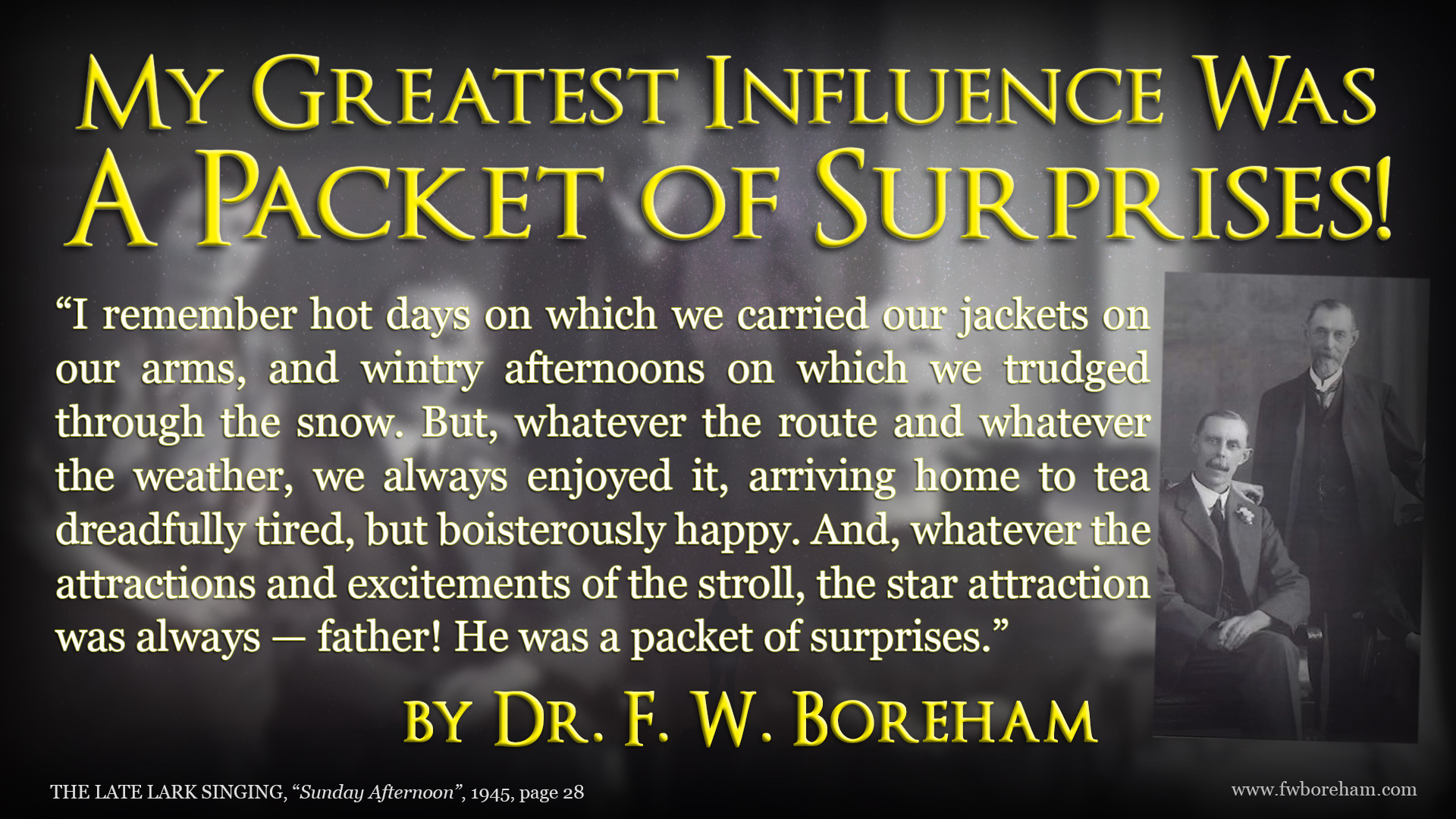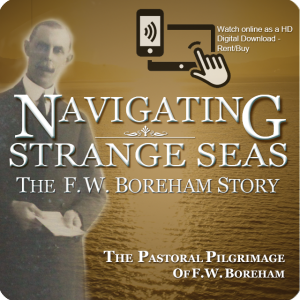home > books by FWB > 1945, A Late Lark Singing > Sunday Afternoon
Chapter III
Sunday Afternoon
I never attended Sunday School. This seems, in retrospect, a trifle extraordinary, especially when I remember that my father was the Secretary of the church, and that, in the nature of things, he was in constant association with the superintendent and officers of the Sunday School. Moreover, my uncle and a maiden aunt — the only relatives in the immediate vicinity-were both teachers in the Sunday School and in close touch with us boys.
The mention of my aunt reminds me that my opening sentence must be slightly modified. For, when I was a tiny toddler, my aunt often came home with us after church and stayed to dinner. She then craved permission to take me with her to Sunday School; and, just occasionally, her request was granted. Her class was a class of senior girls and I vividly remember being severely mauled by these charming young ladies as they attempted to decide the all- important question as to between which of them I was to sit. They moved me hither and thither like a pawn on a chess-board. Perhaps, just at first, I rather enjoyed all this coddling and cosseting. It was pleasant to be made such a fuss of. But, as I became less and less of a baby and more and more of a boy, its appeal diminished and I aided and abetted my parents in rejecting my aunt’s well-meant overtures.
The question then arose, of course, as to whether or not I should go in the ordinary way, taking my place with other small boys of my own age in one of the junior classes. But my mother was strongly averse to it, and my father, although not feeling so decidedly, yielded to her wish; and thus it came about that neither I, nor any of my brothers and sisters, ever went to Sunday School.
My mother was a woman of strong opinions and prejudices. She knew her own mind and seldom gave a reason for any judgements that she formed, If any of us asked her why we were not allowed to go with other girls and boys to Sunday School, she simply told us that she liked us all to go to church with father and herself on Sunday morning; that she liked us to spend Sunday evening with herself; and that she thought that this was quite enough.
‘I want you to remember’, she would say, ‘all that you hear in church on Sunday mornings; and I want you to attend to all that I say to you and read Sunday nights; and I really think that this is as much as you can manage.’
I have told elsewhere of those never-to-be-forgotten Sunday evenings. That was the golden hour of the whole week. On Sunday evening father went to church alone, or taking with him just one of us for company. I do not know to this day whether we were most pleased to go or stay. What walks and talks those were in the evening cool of summer, by the starlight of autumn, or as we trudged through the winter snow! A boy tells his father under such conditions things that he would never dream of mentioning at any other time. What questions; what confidences; what revelations! There, surely, stands the true confessional! And we loved to gaze upon the old church at night. It seemed strange to see the stained-glass windows showing their glories to the passers-by instead of to the worshippers within.
Yet, pleasant as all this was, it was costly. For it meant forsaking the circle round the fire. There mother gathered her boys about her; read with us the collect and the lesson that were being used in church; and then held us spellbound with a chapter or two of some delightful book. It is wonderful how many books we got through on those Sunday evenings. Then, before we said good night, we turned out the gas and just sat and talked by the light of the dying embers. Most of us were sprawling on the hearth-rug, sitting on hassocks, or kneeling round the fender. It always ended with a story. And, of all the stories that I have since heard and read, none ever moved me like those stories that, in the flickering firelight, mother told.
This, she used to say, following upon our attendance at church in the morning, was quite enough; she did not wish us to go to Sunday School. We had such implicit confidence in her judgement that we never questioned her decision; never rebelled against it; never asked to be allowed to accompany the other boys. We took it for granted that she had excellent grounds for her conclusion, although it did not occur to me until many years afterwards to speculate as to what her reasons were.
I fancy that I have already hinted at her real reason, or, at least her main one. Father probably told her, when they were by themselves, of the way in which we opened our hearts to him in walking to and from the church on Sunday evening. But this opportunity only came to each of us once in every few weeks. I fancy that she thought that we needed more of that kind of thing. She distrusted her own feminine authority over our boyish minds. She felt that we needed more of the masculine touch, She had, as we all had, a tremendous admiration for my father. She was anxious that we should feel, as fully as circumstances would permit, the impact of his fine character upon our own. And, looking back upon it now, I feel certain that we were kept away from Sunday School in order that we might spend Sunday afternoon with father.
During the week we saw very little of him. He went off every morning to his office, and, when he returned in the evening, he brought with him a pile of papers to be dealt with before bedtime. On summer evenings he was busy in his garden, whilst we ourselves rushed out as soon as home-lessons were done and only returned from cricket in time to say good night and go to bed. In the winter evenings, the bagatelle-board was opened. Father sat at a little table in the corner of the room, working away at his everlasting papers; but he liked to have a part in every game. When it was his turn to handle the cue, he dropped his pen, rose, played his hand, inquired as to the state of the contest, rallied his partners if they were losing, derided his opponents if things were going well for his side, and then, with a laugh, returned to his desk. This was all that we saw of him except on Sundays.
He was, however, a strict Sabbatarian. Between Saturday and Monday he never even glanced at his books and papers; and, except for strolling up and down it, pipe in mouth, he never on that day touched his beloved garden.
But on Sunday afternoons he went for long, long walks. He passionately loved the town in which we lived. He really thought that, in the entire solar system, there was no place to compare with Tunbridge Wells. Indeed, this enthusiasm of his accounted in large measure for that mass of correspondence that absorbed his evenings. He inaugurated a society for the promotion of the interests of the town and was for many years its Secretary. He went to no end of trouble to see that appealing photographs of our local beauty spots were displayed in hotel lounges and railway compartments throughout the country; and he organized first-class cricket matches, and similar attractions, in order to bring crowds of people to the town to behold its fascinations for themselves. I distinctly recall a certain day on which he told me that he had an appointment with Dr. W. G. Grace concerning a match that he was hoping to arrange. Would I care to accompany him? I went; shook hands with the bearded giant; and, in my association with other boys, could talk of nothing else for weeks afterwards. They must have wished that W. G. Grace had never been born—or that I had not been!
Arising from his fondness for Tunbridge Wells was his keenness in exploring it. The town, which, with its extensive common and its picturesque parks, is beautiful in itself, was-and, in a minor degree, still is-entirely surrounded by undulating hills and graceful valleys, spreading fields and shady woods, old-fashioned farms and romantic little villages. Set out in whatever direction you like, and you have to travel far before finding your eyes feasting on a banquet of sylvan loveliness.
I know; for father revealed it all to me. On Sunday, as soon as we returned from church, we had dinner-the one dinner of the week at which we were all present and over which we could take our time. Then, whilst we each of us followed our own fancy, father stretched himself out in his capacious armchair and quickly fell into a deep and sonorous sleep. But not for long. After half an hour or so he would open his eyes, glance around, walk across to the window and ask: “Who’s for a walk?”
Who wasn’t? Sometimes mother said that she would come. But in the days of which I am specially thinking she so often had a baby in her arms—or on the way—that her presence was only possible during comparatively brief periods. But she loved those Sunday afternoon rambles as much as any of us; and we enjoyed them all the more when she was able to come.
In the afternoon we did not march, two by two, as in the morning. The morning outing was, literally, a church parade. But, in the afternoon, it was a case of go-as-you-please. Father-tall, erect, soldierly, never hurrying and never dawdling-strode on in front. Sometimes one or two of us would walk beside him, chatting merrily or asking questions. Sometimes, if something in field or hedgerow attracted our attention, we would all drop behind, and then, when the momentary diversion had lost its charm, we would set out at top speed in pursuit of our leader.
We did not like to be too long separated from him. He seemed to know everything about everything, and what he did not know he wrested from the big encyclopaedia as soon as we reached home. He knew, at any rate, where every bird’s nest was to be found. He knew how to start a rabbit from the burrow by the roadside; how to find the weasel under the oak-tree; how to unearth the stoat on the bank.
Moreover, he not only knew things; he knew people. We would drop in at quaint old farm-houses and be shown all that there was to see and be told all that there was to tell. As a special treat we were taken down to the byres at milking-time and regaled each with a mug of warm milk, straight from the cow. Or, in the hopping-time, we were taken to the bins and into the oast-houses.
I have no idea as to the number of different walks he took us. We seldom seemed to be pursuing a familiar path, There was the walk across the Common to Rusthall, past the Toad Rock and on through the woods to the old church at Speldhurst, returning by way of Langton; there was the walk to Eridge, across the park and past the Castle, always made fascinating by the herds of fallow deer grazing in the hollow; there was the walk along Forest Road, past the beautiful New Cemetery into Frant village, culminating in a rest beside Frant Church at a spot from which we looked out on a bewilderingly extensive panorama of tilth and pasture, woodland and stream; there was the walk to High Brooms, and up though Powder Mill Lane to Southborough and home by a kind of bridle-path that, twisting this way and that way, brought us at last to the back of the town. And there were scores of others.
Nothing but a steady rain stood between us and these Sunday afternoon rambles. I remember hot days on which we carried our jackets on our arms, and wintry afternoons on which we trudged through the snow. But, whatever the route and whatever the weather, we always enjoyed it, arriving home to tea dreadfully tired, but boisterously happy.
And, whatever the attractions and excitements of the stroll, the star attraction was always — father! He was a packet of surprises. He always had something fresh to tell us, something new to show us, and was always up to tricks. A favourite jest of his, if we dropped too far behind, was to hide somewhere in the woods, leaving us in a quandary as to whether to waste time in searching or to run for our lives in order to overtake him.
These Sunday afternoon walks created a kind of atmosphere. We always regarded him in the light of the spirit that they generated. When we saw him open the vestry door for the minister, and then walk solemnly to his place at the end of our pew, whilst the preacher climbed the steps of the beautiful white pulpit, his ceremonial gravity was softened in our eyes by the thought of those afternoon excursions, And when, once every day, he led us in family worship, his deep, impressive tones and reverential bearing were robbed, for us, of anything terrifying or forbidding by the association of his personality with the felicity of our Sunday jaunts.
And so it came about that I never attended Sunday School. It was, I have no doubt, a serious deprivation. And yet the compensations were so rich that I have never been able to lament my loss. The memory of those Sunday afternoons with father is so sweet and so sacred that I have never had it in my heart to censure my mother’s inflexible decision.
-F.W. Boreham





















0 Comments